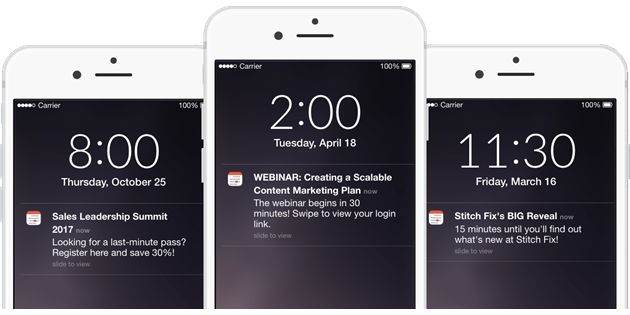In our age of information overload, engaging your audience is more challenging than ever. It often seems that novel digital experiences, such as interactive video and virtual reality, are the solutions to cutting through the noise. But even though they are immersive and exciting, those approaches don't always fit into customers' lifestyles.
Instead of diverting customers' attention elsewhere, brands can create more effective experiences by meeting customers where they're already spending time.
A New Era of Brand-Customer Relationships
Today's consumers check their phones a whopping 150 times per day and spend slightly under one minute per session, according to a Google study.
We use many of those sessions for checking the time or sending quick texts, but during others we take action on whatever we want or need right now. Those "I want to know," "I want to go," and "I want to do" moments are loaded with intent and immediacy. They are the moments when consumers expect brands to be timely, relevant, and useful.
Today, successful brands are taking advantage of this behavior with personalized marketing approaches that are tailored to consumers' daily habits. Case in point: calendars.
Why Calendars?
Calendars may not be the first thing that comes to mind when considering marketing channels, but they're one of the most ubiquitous digital platforms used today. They are installed on every mobile device, over 2.6 billion worldwide, and their reach rivals that of email, coming in at a close second.
Calendars inherently tap into consumer intent at an exact moment. As channels most closely tied to the physical world, telling us where we need to be and when, calendars drive meaningful engagement at the right times. In fact, consumers are 86% more likely to take action on something if a related event is in their calendar.
Calendar Marketing: The 'Last Mile' That Drives Action
That potential of calendars to reach audiences has led several companies to calendar innovations to help brands leverage them as a marketing channel.
For example, smart "add to calendar" buttons can be embedded on websites, emails, or social media accounts, allowing consumers to add dynamic events (e.g., promotions) to their own calendar. Among other innovations are the ability to send personalized calendar notifications (beyond the default 15-minute reminder alert), capture emails when consumers add to calendar, and access calendar analytics. Unsubscribe rates are less than 1%, and so brands can build strong relationships through ongoing communications.
Whether it's driving attendance to a webinar, traffic to a tradeshow booth, or logins to an application, marketers in various industries can leverage calendar capabilities to drive repeat engagement at specific times.

Best-Practices to Keep Customers Happy and Engaged
As you might've guessed, calendars aren't your typical marketing channel. Unlike traditional media, where people are accustomed to ads, the calendar is a much more personal medium. Irrelevant or generic content should be avoided to keep the customer experience as helpful as possible.
When used properly, calendars allow marketers to be present during crucial steps in the customer journey and boost overall conversions.
Here are four best-practices for calendar marketing campaigns:
1. Provide a seamless opt-in experience
Carefully select the channels you'll use to share your "add to calendar" buttons. Different industries and job roles respond better to different channels. A personalized email may resonate with VPs at some of your target accounts, whereas a LinkedIn post might trigger more positive responses with managers at other accounts.
Also, whether your customers are using Google Calendar, Outlook, or iOS, make it easy for them to add your promotions to their calendar. Make sure your buttons work for the most common calendar types.
2. Get personal
Group your customers by their behavior, interests, location, or other relevant profile data to effectively target your promotions. This is especially important because calendar marketing involves push notifications.
Push notifications pop up above everything else and will annoy customers if they don't provide value. So the more personalized you can get, the more likely people will see your message and truly believe your message—and product—is for them.
Customer experience remains one of the biggest differentiators in today's market, so taking the time to get personal is worth your while.
3. Keep your messaging succinct and informative
As with email, your customers should know what they will get when they open your message and shouldn't be surprised when they do. Make your point quickly and leave out fluff. Keeping your message succinct and informative will prove to customers that you understand what they need and that you respect their time.
4. Measure, rinse, repeat
Take note of opens, link clicks, social shares, and other engagement inside the calendar so you can optimize your campaigns. Several calendar marketing tools can help with that piece of the job. You can then use that data to enhance lead records in your CRM (Salesforce, Marketo, HubSpot, etc.).
Calendar activity is a strong indication of intent to take certain actions, and your sales team will be happy to take advantage of that information.
* * *
Leading brands, such as IBM, Forrester, and Microsoft, have tapped into calendars to transform their customer journeys. Check out this guide to learn how thousands of companies are integrating calendars into their marketing strategies.




